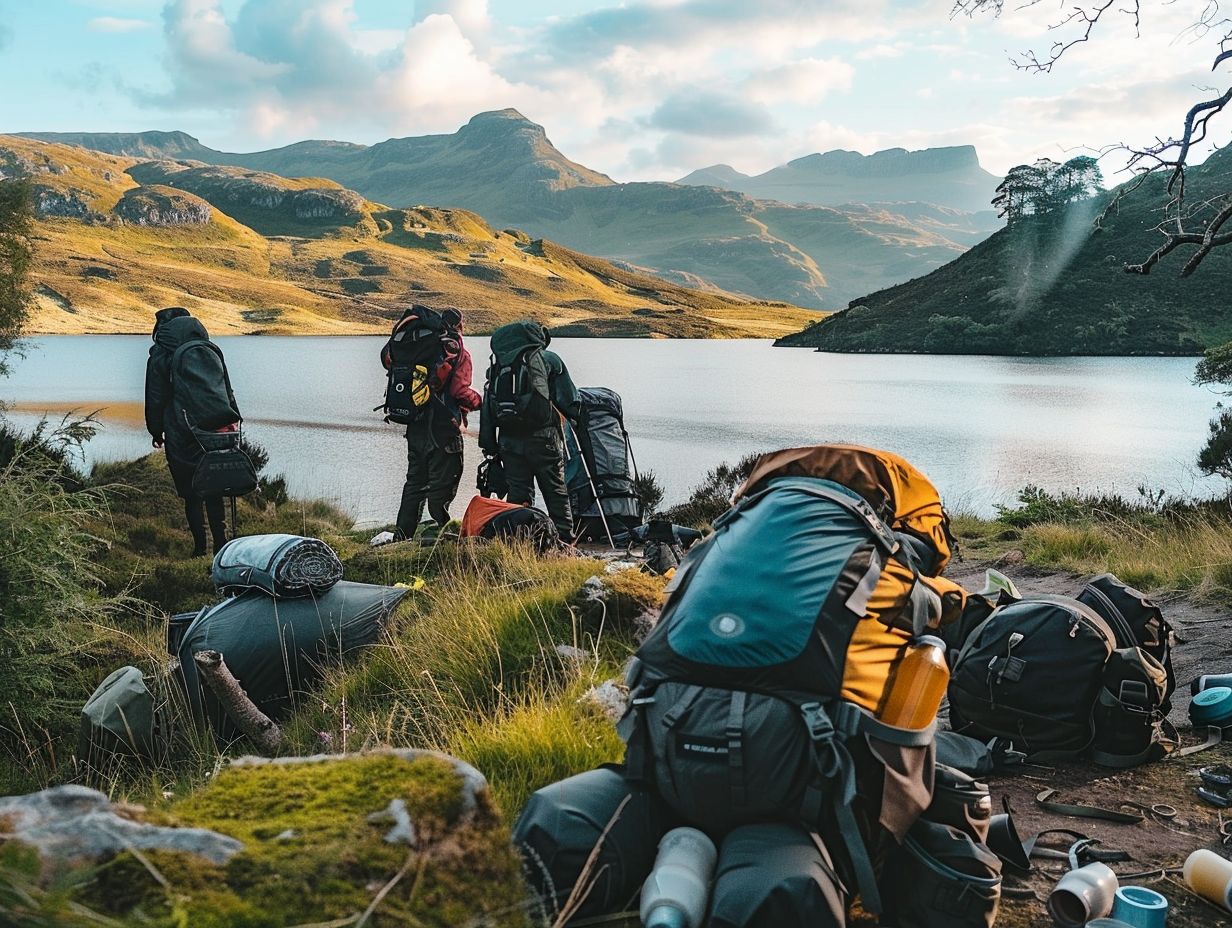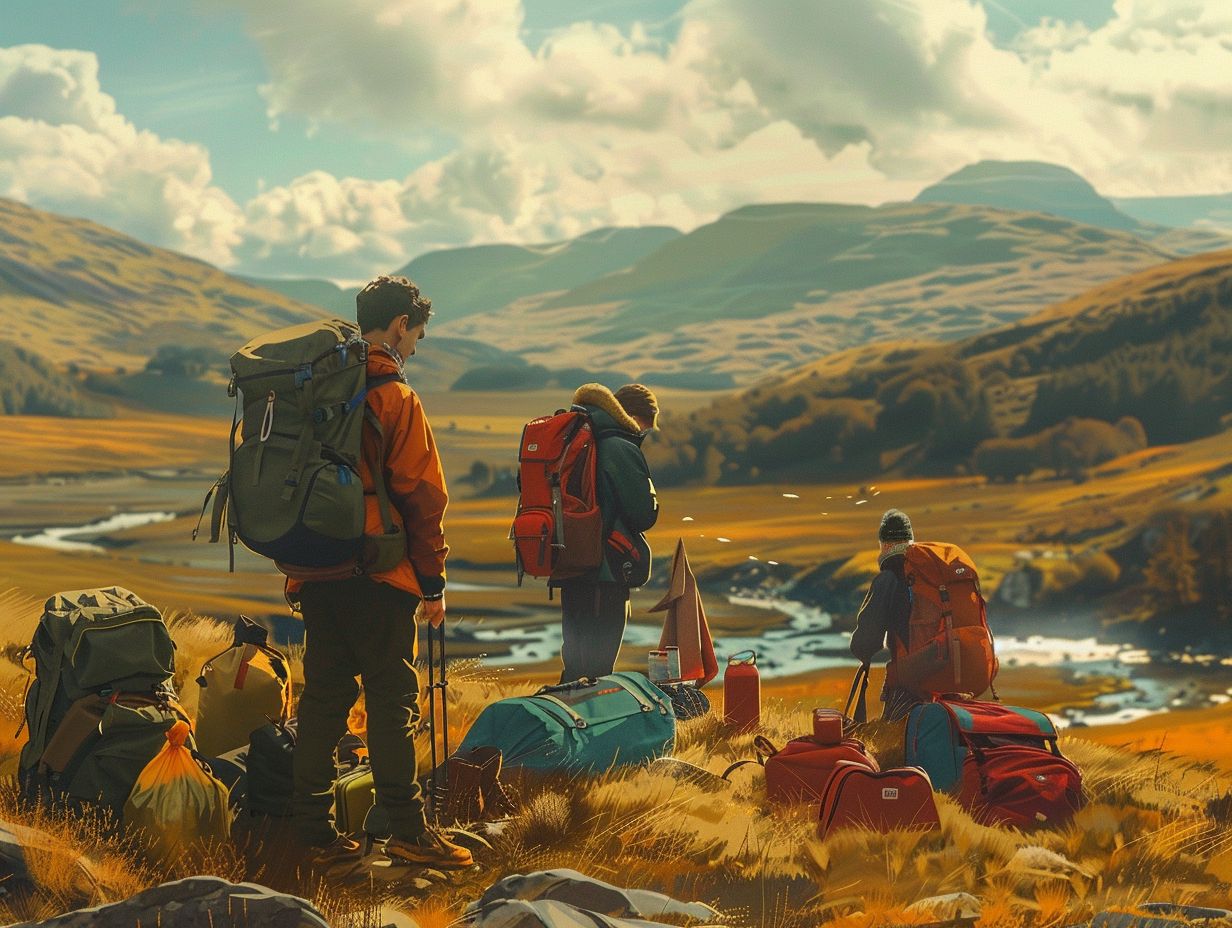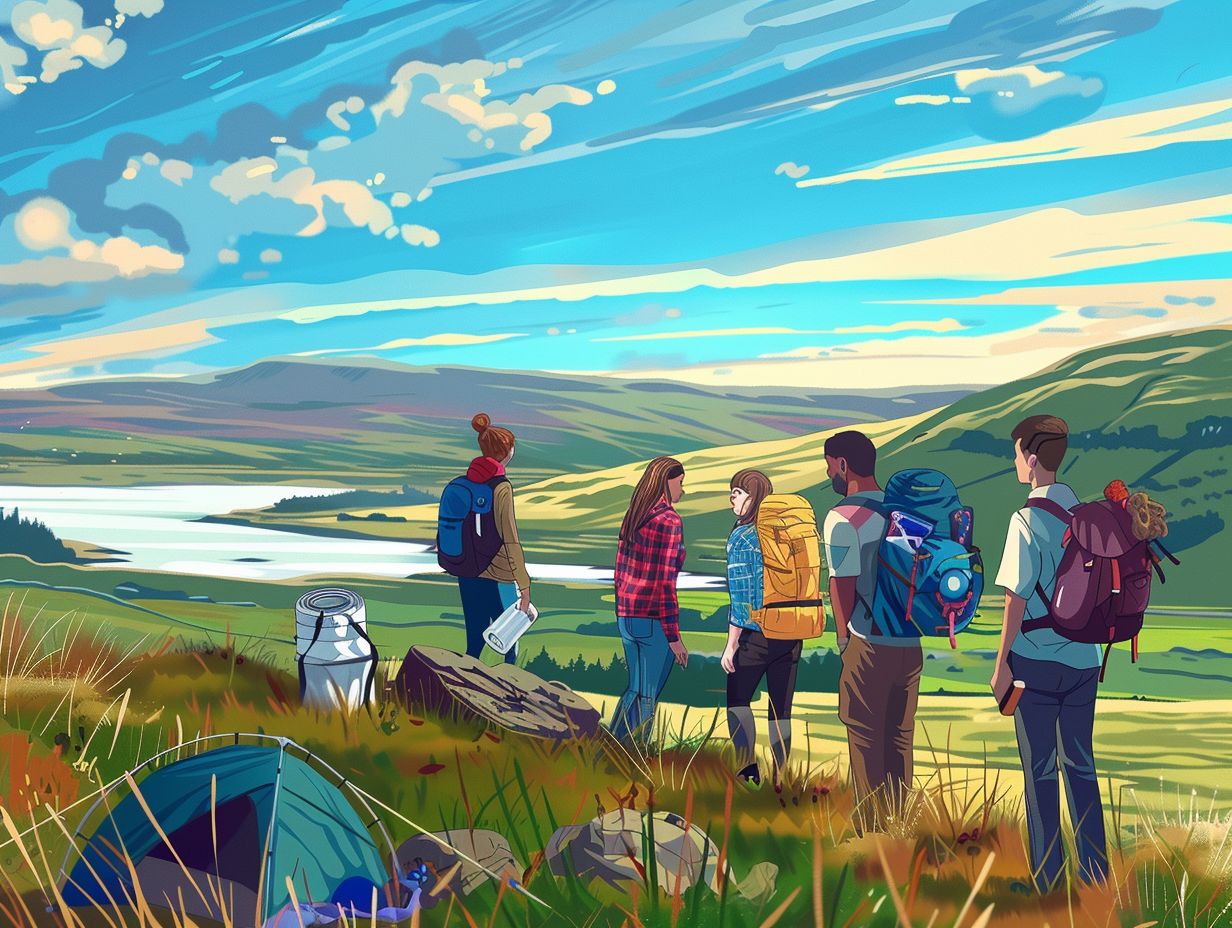Planning a camping trip in Scotland involves selecting the ideal campsite, packing necessary gear, preparing for unpredictable weather, and implementing safety measures.
All key aspects of preparing for a camping adventure in Scotland will be discussed, including suggested equipment, meal planning strategies, nearby activities and attractions, and emergency readiness.
Prepare for an unforgettable outdoor experience amidst the breathtaking Scottish landscapes.
Key Takeaways:

- Choose a campsite in Scotland that suits your needs and preferences, considering factors like location, amenities, and cost.
- Bring essential gear for camping in Scotland, including a sturdy tent, warm sleeping bag, and waterproof clothing.
- Be prepared for the unpredictable weather in Scotland by planning for rain, wind, and cold temperatures, and always check the forecast before your trip.
Choosing a Campsite in Scotland
When planning a camping trip in Scotland, you should prioritize selecting the ideal campsite to ensure a memorable outdoor experience surrounded by the stunning landscapes and natural beauty of the country.
- Factors to take into account when choosing a campsite in Scotland include the location. It is essential to ensure it is conveniently located near the desired hiking routes for easy exploration.
- Examining the amenities provided at the campsite, such as toilets, water sources, and waste disposal facilities, can enhance your camping experience by increasing comfort.
- Additionally, it is crucial to select a site that adheres to the Scottish Outdoor Access Code. Respecting the environment, wildlife, and fellow visitors is paramount while relishing the wonders of the great outdoors.
Factors to Consider
When you are considering a camping site in Scotland, it is important to take into account various factors to ensure a successful and enjoyable camping experience. Safety rules, proximity to hiking routes, access to water sources, and adherence to outdoor regulations all play a crucial role.
As a camper, it is crucial for you to assess the safety measures in place at the campsite, including fire regulations and emergency procedures. Checking the proximity of the campsite to hiking routes not only adds to your camping adventure but also provides easy access to opportunities for exploration. Ensuring access to clean water sources for drinking and other needs should be a top priority when selecting a campsite.
Familiarising yourself with the specific rules and regulations of the campsite helps promote responsible outdoor behaviour and aids in preserving the natural beauty of the surroundings. Additionally, considering the availability of facilities such as bathrooms, waste disposal areas, and designated cooking areas can enhance your overall camping experience.
Essential Gear for Camping in Scotland
When embarking on a camping trip in Scotland, it is imperative to have the appropriate gear to ensure a successful outdoor experience. The ever-changing weather conditions and diverse landscapes in Scotland necessitate the use of proper equipment for both comfort and safety throughout your adventure.
A crucial piece of equipment for camping in Scotland is a durable and weather-resistant tent that can provide protection from rain and wind. Additionally, investing in a high-quality sleeping bag that is suitable for the temperature range is essential to ensure warmth during colder nights.
It is also important to have cooking supplies on hand, such as a portable stove, utensils, and food storage containers, to facilitate meal preparation. Remember to pack suitable clothing layers, including waterproof jackets, insulated clothing, and sturdy hiking boots, to accommodate the rugged terrain that you will encounter.
Furthermore, safety gear should never be overlooked for any camping excursion. It is highly recommended to carry essentials such as a first aid kit, headlamp, and emergency whistle to ensure preparedness for any unforeseen circumstances that may arise during your outdoor journey.
Recommended Equipment
When preparing for camping in Scotland, you will need essential kit to ensure a comfortable and safe outdoor experience amidst the rugged beauty of the Scottish landscapes. It is crucial to invest in a high-quality tent to protect yourself from Scotland’s unpredictable weather conditions.
Look for tents made of robust waterproof materials with sturdy poles that can withstand wind and rain. Depending on the season, consider a 4-season tent for winter camping or a lightweight, breathable tent for summer trips.
A good sleeping bag rated for low temperatures is essential for a warm night’s sleep. Make sure to pack a durable camping stove for cooking meals and a comprehensive first aid kit for any emergencies that may arise.
Proper clothing layers are also vital, including waterproof outerwear and thermal base layers, to help you adapt to Scotland’s ever-changing climate. These items will enhance your camping experience and ensure you are prepared for any challenges that may come your way.
Preparing for the Weather

When camping in Scotland, you must be prepared for the unpredictable weather conditions that can present challenges due to the diverse environments and ever-changing climate of the country. Expect a mix of sun, rain, wind, and occasionally snow, sometimes all within the same day.
To effectively navigate these conditions, it is recommended to pack layered clothing for warmth, waterproof gear to protect against rain showers, and sturdy footwear suitable for rugged terrains.
Monitoring weather forecasts closely and having contingency plans for severe weather are essential to ensure a safe and enjoyable camping experience amidst Scotland’s breathtaking landscapes.
What to Expect and How to Plan
Before embarking on a camping trip in Scotland, you need to understand the typical weather patterns, be aware of camping regulations, and pack accordingly. These are essential steps to ensure a successful and enjoyable outdoor adventure in the Scottish wilderness.
Scotland’s weather can be unpredictable, with rain showers and cool temperatures common throughout the year. It is crucial for you to be prepared for varying conditions by bringing waterproof clothing, sturdy footwear, and extra layers.
You should familiarise yourself with the rules and regulations of the camping sites you plan to visit, as some areas may have restrictions on campfires or specific guidelines for waste disposal. Taking these factors into consideration before your trip can help you plan efficiently and make the most of your camping experience in Scotland.
Food and Cooking Options
When planning meals for camping in Scotland, you have a variety of options to consider for cooking, from traditional campfire methods to modern camping stoves.
It’s important to think about storage techniques to maintain the freshness of your ingredients and reduce waste. Using cool boxes with ice packs can help preserve perishable items such as meat and dairy products.
Preparing ingredients in advance for easy access can simplify the cooking process. As a camper in Scotland, you can enjoy grilling freshly caught seafood from the local lochs or preparing hearty stews in Dutch ovens over the campfire.
These cooking methods not only add a rustic touch to your camping adventure but also enhance the flavours of the local produce and ingredients available in the area.
Meal Planning and Storage Tips
Effective meal planning and food storage are crucial elements of a successful camping trip in Scotland. Ensuring that you have enough sustenance to fuel your outdoor adventures, whether it’s a day hike or a more extended camping expedition, is key.
When you are getting ready for a camping trip, it is important to consider the types of meals that are easy to prepare outdoors and provide the necessary energy for your activities. Packing lightweight and non-perishable items such as granola bars, nuts, and dried fruits can be convenient for quick snacks while on the go.
Bringing a portable camping stove or grill along allows for a wider variety of meal options. Properly storing perishable items in insulated coolers or using ice packs can help prevent food spoilage and ensure food safety throughout your trip.
Exploring the Surrounding Areas
When camping in Scotland, you have the chance to not only connect with nature but also to explore the surrounding areas. There are numerous hiking routes, nature walks, and outdoor activities for you to immerse yourself in the beauty of the Scottish landscapes.
As you immerse yourself in the enchanting wilderness, you can venture along the famous West Highland Way, enjoying panoramic views and rugged terrains. If you prefer a more gentle experience, the serene Loch Lomond and Trossachs National Park offer tranquil nature walks amidst lush forests and shimmering lochs.
For adrenaline junkies like yourself, the challenging trails of the Cairngorms National Park provide opportunities for mountain biking and rock climbing. Whether you enjoy stargazing under the pristine Scottish skies or kayaking in crystal clear waters, Scotland’s outdoor offerings cater to every adventurer’s desires.
Activities and Attractions

Scotland’s diverse landscapes offer a plethora of outdoor activities and attractions for campers. From wildlife watching to nature strolls, visitors will have a rewarding camping experience that immerses them in the natural marvels of the Scottish wilderness.
When exploring the Scottish Highlands, campers can come across majestic red deer, elusive wildcats, and soaring golden eagles in their natural habitats. Guided nature strolls through ancient forests and along scenic lochs reveal a wealth of plant life and wildlife that is unique to Scotland.
For those looking for adventure, there are chances for trekking rugged mountain paths, canoeing on clear lochs, or even trying their hand at clay pigeon shooting surrounded by stunning scenery. The Scottish wilderness truly offers an unmatched playground for nature enthusiasts and outdoor lovers.
Safety Precautions for Camping in Scotland
When camping in Scotland, it is crucial to prioritise safety due to the challenging terrain, unpredictable weather conditions, and potential encounters with wildlife. To ensure a safe and enjoyable outdoor experience, comprehensive emergency preparedness and wildlife safety measures are necessary.
Being prepared for emergencies is essential. Always carry a first aid kit, be aware of the nearest medical facilities, and familiarise yourself with emergency contact numbers. When selecting a campsite, opt for a safe location away from cliffs, maintain a safe distance from wildlife, and securely store food to avoid attracting animals.
Additionally, it is important to check for any local advisories or regulations concerning wildlife interactions and to show respect for the natural habitat you are exploring.
Emergency Preparedness and Wildlife Safety
Being well-prepared for emergencies and understanding wildlife safety rules are essential components of a safe camping trip in Scotland, where having the right equipment, knowledge, and precautions can mitigate risks and enhance your overall camping experience amidst the natural beauty of the Scottish outdoors.
It is crucial for you to pack a first aid kit containing essential items such as bandages, antiseptic wipes, pain relievers, and any personal medications.
Make sure to familiarise yourself with the correct way to set up a campsite to minimise potential hazards.
When exploring the wilderness, always carry a whistle and a torch for signalling in case of emergencies.
Remember to keep your food securely stored to avoid attracting wildlife, and adhere to guidelines for disposing of waste properly to maintain the ecological balance of the environment.
Frequently Asked Questions
What are the must-haves for preparing for a camping trip in Scotland?
Some must-have items for a camping trip in Scotland include a sturdy tent, warm and waterproof clothing, a reliable map, a first aid kit, a cooking stove and utensils, and proper camping permits.
What type of weather should I expect when camping in Scotland?

Weather in Scotland can be unpredictable, so it’s important to pack for all types of weather. Expect rain, wind, and cooler temperatures, even during summer months.
Do I need any special permits for camping in Scotland?
Yes, for camping in the Scottish National Parks, you will need a camping permit. These can be obtained online or at designated visitor centers. In some areas, you may also need a wild camping permit.
What are some lesser-known camping spots in Scotland?
Some lesser-known camping spots in Scotland include Glen Etive, Glen Affric, and Culbin Forest. These spots offer stunning natural beauty and a quieter camping experience.
What safety precautions should I take when camping in Scotland?
Some safety precautions to take when camping in Scotland include checking weather forecasts, practicing Leave No Trace principles, informing someone of your camping plans, and being aware of potential hazards in the area.
Can I camp anywhere in Scotland?
No, wild camping is not legal everywhere in Scotland. It is important to research and obtain necessary permits before camping in any area, and to always follow the Scottish Outdoor Access Code.



